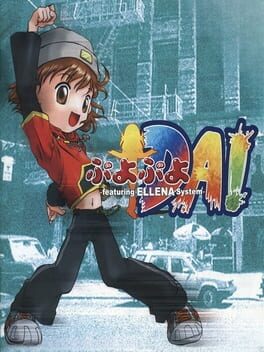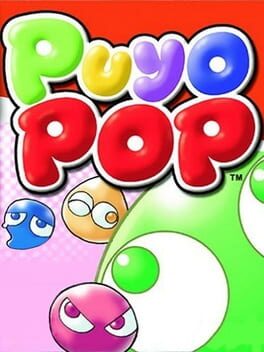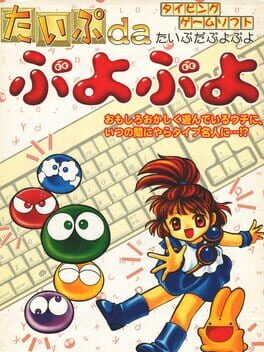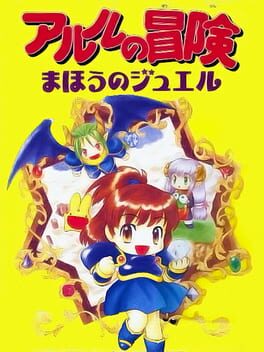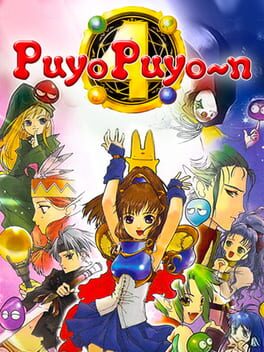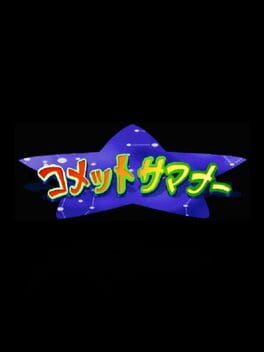

Puyo Puyo DA! is a Dance Dance Revolution based game for the Dreamcast with Puyo Puyo characters. This game is based off a Disc Station game previously featuring Ellena Stevens. In contrast to most Puyo Puyo games, a large majority of the text in this game is in English. It was Compile's last Puyo Puyo game to be released on a Sega system. (The last Compile game in the series, Puyo Puyo Box, released a year later.)
Also in series
Reviews View More
ngl tho, the Puyo Puyo/Madou Monogatari cast have the drip, like they actually resemble their personalities. Of course Arle wears baggy pants, Schezo is the maracas himbo, Satan's our fishnet sexyman, and Rulue hangs out at Hot Topic. I'm sure someone at Compile just got hammered one night and asked "why don't we just dress the gang in American urban wear and have them dance like PaRappa?" That's one big problem with bosses taking you out to drink: you never know what random thing you'll say that later becomes a 1999 PaRappa the Rapper-like.
| The rise and fall of Puyo, Madou, Compile, and more |
There's both little to say and so much to cover with Puyo Puyo DA!, one of Compile's final releases. It's a hastily made, simplistic rhythm title bandwagoning on the hip-hop dog's success. There's a scant eight songs for eight minimally different characters, with only the most basic single-player and multi-player modes. And the actual rhythm game part of this package isn't much to speak for, either. I can sense that the devs generally matched distinct notes, rhythms, and other musical bits to the button charts they designed, but the laggy input processing means you're always tapping a bit behind the beat. Must I explain why that's frustrating and should have gotten at least a week to test-fix? Neither are the charts and songs varied enough to compete with its direct inspiration, let alone so many BEMANI series which trounced it in content and playability. The crust is real, folks—presentation and a great soundtrack save this from the trashcan, but how'd Compile go from one of Japan's most consistent self-publishers to…whatever greenlit this?
Prior to folding and its IPs scattering to the winds, the company had dug itself into a corner in every way. Masamitsu "Moo" Niitani and other leaders had drastically shifted Compile's direction away from their varied arcade-y shooters, puzzlers, xRPGs, etc. which brought them critical and commercial success. These still existed and even thrived on Disc Station subscription disks/CDs for various PCs, but on consoles and in arcades, Puyo Puyo and its parent series Madou Monogatari were the cash crops de jour. [1] Puyo Puyo did so damn well in game centers, rivaling many popular versus fighters in popularity, that Niitani centered most of the studio's resources around sequels and spinoffs. And all those largely similar Madou remakes for different machines proved fruitful, for a time. I mean, sure, they've effectively spurned their STG developers away by throwing all their resources at excuses to spread le smug Carbuncle face everywhere, which is why talent like Yuichi Toyama left sometime in 1992 to form Raizing (8ing). That's not a bad sign, right?
You bet it was. Things went far worse in other market sectors that Compile soon targeted. Though various Puyo-Madou merch sold well during the series' heyday, like the Puyoman manju candies, the cooling (though not dead) interest in these combat puzzlers left the corporation and its partners saddled with inventory and frustrated distributors. [2] Both an ill-advised new office in Fukuoka and a dead-on-arrival business software suite called Power Acty tightened their slim wallets even further. Worst of all, though, Compile just didn't have the mainstream console and PC presence they used to. Cash-cropping Puyo-Madou to such degrees hurt not only their blockbuster action games, but even the smaller faire reserved for Disc Station and handhelds. Difficulty courting new talent, insubstantial series entries sent to die on nearly dead consoles (all those late-stage Mega Drive carts!), an unwillingness to experiment with MMOs or get more involved with their surprising Disc Station hype in South Korea…I could go on. Compile found Incredible New Ways to Bleed Money seemingly every quarter from around 1996 to 1998, which eventually had them filing for bankruptcy and promising Puyo-Madou's rights to SEGA if unable to pay them back by 2002.
With some fresh cash from restructuring, Compile had precious few years left to use the Puyo-Madou IP intact before ceding them to the new owners. So, not learning any lessons from this outcome, they doubled down on the franchise even harder. Their lack of confidence in starting new big properties, let alone bringing any non-Puyo games to the PS1 while it was hot, led to quick, often copycat products on the SEGA systems they were overly familiar with. Wait, that's a great idea: have our Puyo-Madou guys make us some hit DC software! I'll admit that a Puyo spinoff's still got more immediate appeal to our Western eyes than something wholly new or remade from the Disc Station catalog. Except the latter's what happened anyway. Puyo Puyo DA! exists partly thanks to an earlier PC-98 minigame called Broadway Legend Elena. Now both games can be done dirty for the good of getting Compile off its bruised back! And I'd even be fine with that if this GD-ROM had sold well enough to save at least the development studio. No dice. Our beleaguered company limped along until 2003, with very few games releasing that late except on PC and handhelds. Zanac X Zanac and Guru Logic Champ deserved better than this, as did Wander Wonder, After Devil Force, Geo Conflict…argh. IGDB doesn't even many of these games listed yet, a telling sign of the studio's late-stage irrelevance.
We live in one of the timelines ever, and this one sadly saddles us with Compile Heart, SEGA arguably mishandling the Puyo-Madou war chest over time, and most other IPs receiving basic re-releases by the Project EGG people. Quite the downfall from the company's mid-'90s apex, back when you could find ads and broadcasts showcasing their swag and software on major networks. [3] You'd think that a Compile flush with cash would have tried bringing way more of their products out West during this time, a wise investment that would have made banks and investors plenty happy. Of course, why take that risk when you could just hire the army of staff needed to draft up a Puyo-Madou theme park, buy the land, and start construction? [4] Genius planning there, guys. It's almost like chasing trends which were clearly fads ended up kneecapping this corp in no time flat, a pattern as old as the consumer electronics industries in Japan, the U.S., etc. going back to the '60s. Localization efforts to broaden their market beyond this domestic audience wouldn't have seemed as glamorous, sure, yet they could have kept Compile going on its own terms for a long time.
| Grooving out like there's no tomorrow |
Oh, right, where does Puyo Puyo DA! factor into all of this? I doubt this game exists in place of some unknown better project (though I won't rule it out), yet it's still bittersweet to try out today. One could get quite a bit of fun from this if they're a fan of the genre, and/or love to watch these Puyo masters dabbing on each other for an hour. There's also Elena (or Ellena, IDK), no longer having a funny story mode like in her original game. She's not even one of the easy characters to play as, getting harder charts than Arle or Suke-T despite having subtitle spotlight on the game's cover. As I booted in, skipped the minimal options menu, and started a regular game using Ellena, this was beginning to look dicey. At least the window dressing's cute; chunky lower-poly modeling on this platform almost always looks nicer than it should. Each level is colorful, readable, and thematically appropriate. Everyone on stage has a hypnotic cadence, and
I keep bringing up Ellena's game because it did, in fact, predate PaRappa and other Simon Says-style rhythm classics from that hardware cycle, a legacy which the game loop in Puyo Puyo DA! neither advances nor matches in quality. Broadway Legend Ellena didn't have the combo chaining mechanic you can mildly synergize with here, yet that still felt like a dream compared to this. Set aside the aforementioned lack of music-input sync and we're stuck with a very limited set of commands to dance with. Face buttons and that blistering DC d-pad let you tap all four colors of Puyo while shoulder buttons handle the sun Puyo—where the fuck's the analog stick?! Every instance of tapping three or more 16th-note Puyos, wondering if input lag or my fingers would mess up first, has me wishing I could instead twist quarter-circles to accomplish the same. Better yet, having to use both Puyos and analog-based dancing motions would have added something meaningful to the pace and diversity of charts. All the characters feel too same-y without that extra layer, and the most engagement I found here came from executing some downright evil split-second segments.
Puyo combos are a minor mix-up to the formula, too, which I noticed mainly when the tide of duels went against me. Like in a classic Puyo match, nailing all your inputs in a row showers the opponent's "junk" bar with evil blobs. However, this presents a false sense of strategy; either player, real or AI, will lose the match if even one junk Puyo remains on their side. Compile could have added scaling thresholds of how much trash you can take on before toggling that lose state, but no, it's truly all or nothing, and the final rounds against Satan and Rulue on Hard become needlessly evil. Hell, the main series' concept of a filling, claustrophobic playfield is absent here, which makes death-by-grey-goo feel even weirder. It really grinds my gears to witness this much potential being squandered for reasons I have no way to verify. Did the team run out of time or money later in development? Was this always a cheapie, recycling nearly its whole soundtrack from Compile's own albums while tasking their few 3D modelers to do the real work? One day we'll uncover the truth; I've known the Puyo Puyo fandom long enough to vouch for their dedication and persistence.
| When all's lost, shout from your soul! |
All these grievances haven't overshadowed the main reason I can still play this, thankfully, which is that perverse delight of watching Compile's mascots gyrating to, as the kids call them these days, Absolute Bangers. The studio's sound team, like so many from Japanese developers in this period, had their own in-house vocalists and live band, performing and recording many catchy tunes throughout the '90s. Taken this way, Puyo Puyo DA! unironically succeeds as a sampler disc and playable jukebox in one, entertaining less for how it plays and more through its curated set of discotheque-grade jams. I bring up disco because, relative to the aggressive IDM booming around Y2K, what's offered here might seem tame, cheesy, or downright laughable at times. Maybe I'm a sucker for MIDI synth-brass, karaoke bravado, and canned drum loops, though. Pair this camp soundscape with suitably stiff but charming animation and we've got a winner! Even good 'ol Niitani sings on some of the tracks—good for him.
For all its shortcomings, plus misreading a market moving on to Dance Dance Revolution and other rhythm innovators, I kind of love Puyo Puyo DA! the way only a video game historian can. This absolutely was not the kind of game that could save Compile, and I wonder if it managed to break even considering the Dreamcast's abysmal performance in Japan. Still, it's a hoot for any self-styled Puyo-Madou heads, which I am one of. From those awkwardly easy opening moments to the trial-and-error irritations later on, I still bopped along to Katsumi Tanaka's cheery vocals, no less powerful than Takenobu Mitsuyoshi when you need him. And glancing at my avatar's comical reaction to missing a chain, or the very same from an opponent, kept me going well past the point of dropping this in disgust. Little details here and there tell me that someone at Compile had fun and passion while developing this, even if it started life as yet another hail-Mary from a dying soft house trying to avert disaster. At the very least, we'll have learned more from this event than Moo Niitani ever did—seriously, does he think he can capture lightning in a bottle twice, or are Puyo-style puzzlers the only thing he has left to pitch when starting a new doomed company? What a cursed franchise. Pardon me, it's closing time and I gotta pour one out for Kazunari Yonemitsu and the gang (don't worry, he and the rest at Sting are doing alright).
Completed for the Backloggd Discord server’s Game of the Week club, Apr. 4 - 10, 2023
| Bibliography |
[1] discstation. “コンパイル@DiscStation Wiki.” コンパイル@discstation wiki. アットウィキ, November 19, 2022. https://w.atwiki.jp/discstation/.
[2] compile.co.jp, webmaster @, ed. “Puyoman Products -FOODS-.” Compile. Compile Corporation, November 1, 1996. http://web.archive.org/web/19961101080505/http://www.compile.co.jp/puyoman/goods/foods/index2.html.
[3] Iwaki, Toshiaki, and Yoshito Onishi. “Tokyo Game Show: Puyo Puyo.” Broadcast. Tonight 2 1996, no. August 28. Tokyo, Kanto: TV Asahi, August 28, 1996. https://www.youtube.com/watch?v=UtZB1QNdsi0&t=879s.
[4] さん blitz753challenge, ed. “貴重 ゲーム ぷよぷよ 魔導ランド 直筆絵画 コン...” ヤフオク! Yahoo! Japan, August 17, 2022. https://web.archive.org/web/20220818105430/https://page.auctions.yahoo.co.jp/jp/auction/d1060882018.
| The rise and fall of Puyo, Madou, Compile, and more |
There's both little to say and so much to cover with Puyo Puyo DA!, one of Compile's final releases. It's a hastily made, simplistic rhythm title bandwagoning on the hip-hop dog's success. There's a scant eight songs for eight minimally different characters, with only the most basic single-player and multi-player modes. And the actual rhythm game part of this package isn't much to speak for, either. I can sense that the devs generally matched distinct notes, rhythms, and other musical bits to the button charts they designed, but the laggy input processing means you're always tapping a bit behind the beat. Must I explain why that's frustrating and should have gotten at least a week to test-fix? Neither are the charts and songs varied enough to compete with its direct inspiration, let alone so many BEMANI series which trounced it in content and playability. The crust is real, folks—presentation and a great soundtrack save this from the trashcan, but how'd Compile go from one of Japan's most consistent self-publishers to…whatever greenlit this?
Prior to folding and its IPs scattering to the winds, the company had dug itself into a corner in every way. Masamitsu "Moo" Niitani and other leaders had drastically shifted Compile's direction away from their varied arcade-y shooters, puzzlers, xRPGs, etc. which brought them critical and commercial success. These still existed and even thrived on Disc Station subscription disks/CDs for various PCs, but on consoles and in arcades, Puyo Puyo and its parent series Madou Monogatari were the cash crops de jour. [1] Puyo Puyo did so damn well in game centers, rivaling many popular versus fighters in popularity, that Niitani centered most of the studio's resources around sequels and spinoffs. And all those largely similar Madou remakes for different machines proved fruitful, for a time. I mean, sure, they've effectively spurned their STG developers away by throwing all their resources at excuses to spread le smug Carbuncle face everywhere, which is why talent like Yuichi Toyama left sometime in 1992 to form Raizing (8ing). That's not a bad sign, right?
You bet it was. Things went far worse in other market sectors that Compile soon targeted. Though various Puyo-Madou merch sold well during the series' heyday, like the Puyoman manju candies, the cooling (though not dead) interest in these combat puzzlers left the corporation and its partners saddled with inventory and frustrated distributors. [2] Both an ill-advised new office in Fukuoka and a dead-on-arrival business software suite called Power Acty tightened their slim wallets even further. Worst of all, though, Compile just didn't have the mainstream console and PC presence they used to. Cash-cropping Puyo-Madou to such degrees hurt not only their blockbuster action games, but even the smaller faire reserved for Disc Station and handhelds. Difficulty courting new talent, insubstantial series entries sent to die on nearly dead consoles (all those late-stage Mega Drive carts!), an unwillingness to experiment with MMOs or get more involved with their surprising Disc Station hype in South Korea…I could go on. Compile found Incredible New Ways to Bleed Money seemingly every quarter from around 1996 to 1998, which eventually had them filing for bankruptcy and promising Puyo-Madou's rights to SEGA if unable to pay them back by 2002.
With some fresh cash from restructuring, Compile had precious few years left to use the Puyo-Madou IP intact before ceding them to the new owners. So, not learning any lessons from this outcome, they doubled down on the franchise even harder. Their lack of confidence in starting new big properties, let alone bringing any non-Puyo games to the PS1 while it was hot, led to quick, often copycat products on the SEGA systems they were overly familiar with. Wait, that's a great idea: have our Puyo-Madou guys make us some hit DC software! I'll admit that a Puyo spinoff's still got more immediate appeal to our Western eyes than something wholly new or remade from the Disc Station catalog. Except the latter's what happened anyway. Puyo Puyo DA! exists partly thanks to an earlier PC-98 minigame called Broadway Legend Elena. Now both games can be done dirty for the good of getting Compile off its bruised back! And I'd even be fine with that if this GD-ROM had sold well enough to save at least the development studio. No dice. Our beleaguered company limped along until 2003, with very few games releasing that late except on PC and handhelds. Zanac X Zanac and Guru Logic Champ deserved better than this, as did Wander Wonder, After Devil Force, Geo Conflict…argh. IGDB doesn't even many of these games listed yet, a telling sign of the studio's late-stage irrelevance.
We live in one of the timelines ever, and this one sadly saddles us with Compile Heart, SEGA arguably mishandling the Puyo-Madou war chest over time, and most other IPs receiving basic re-releases by the Project EGG people. Quite the downfall from the company's mid-'90s apex, back when you could find ads and broadcasts showcasing their swag and software on major networks. [3] You'd think that a Compile flush with cash would have tried bringing way more of their products out West during this time, a wise investment that would have made banks and investors plenty happy. Of course, why take that risk when you could just hire the army of staff needed to draft up a Puyo-Madou theme park, buy the land, and start construction? [4] Genius planning there, guys. It's almost like chasing trends which were clearly fads ended up kneecapping this corp in no time flat, a pattern as old as the consumer electronics industries in Japan, the U.S., etc. going back to the '60s. Localization efforts to broaden their market beyond this domestic audience wouldn't have seemed as glamorous, sure, yet they could have kept Compile going on its own terms for a long time.
| Grooving out like there's no tomorrow |
Oh, right, where does Puyo Puyo DA! factor into all of this? I doubt this game exists in place of some unknown better project (though I won't rule it out), yet it's still bittersweet to try out today. One could get quite a bit of fun from this if they're a fan of the genre, and/or love to watch these Puyo masters dabbing on each other for an hour. There's also Elena (or Ellena, IDK), no longer having a funny story mode like in her original game. She's not even one of the easy characters to play as, getting harder charts than Arle or Suke-T despite having subtitle spotlight on the game's cover. As I booted in, skipped the minimal options menu, and started a regular game using Ellena, this was beginning to look dicey. At least the window dressing's cute; chunky lower-poly modeling on this platform almost always looks nicer than it should. Each level is colorful, readable, and thematically appropriate. Everyone on stage has a hypnotic cadence, and
I keep bringing up Ellena's game because it did, in fact, predate PaRappa and other Simon Says-style rhythm classics from that hardware cycle, a legacy which the game loop in Puyo Puyo DA! neither advances nor matches in quality. Broadway Legend Ellena didn't have the combo chaining mechanic you can mildly synergize with here, yet that still felt like a dream compared to this. Set aside the aforementioned lack of music-input sync and we're stuck with a very limited set of commands to dance with. Face buttons and that blistering DC d-pad let you tap all four colors of Puyo while shoulder buttons handle the sun Puyo—where the fuck's the analog stick?! Every instance of tapping three or more 16th-note Puyos, wondering if input lag or my fingers would mess up first, has me wishing I could instead twist quarter-circles to accomplish the same. Better yet, having to use both Puyos and analog-based dancing motions would have added something meaningful to the pace and diversity of charts. All the characters feel too same-y without that extra layer, and the most engagement I found here came from executing some downright evil split-second segments.
Puyo combos are a minor mix-up to the formula, too, which I noticed mainly when the tide of duels went against me. Like in a classic Puyo match, nailing all your inputs in a row showers the opponent's "junk" bar with evil blobs. However, this presents a false sense of strategy; either player, real or AI, will lose the match if even one junk Puyo remains on their side. Compile could have added scaling thresholds of how much trash you can take on before toggling that lose state, but no, it's truly all or nothing, and the final rounds against Satan and Rulue on Hard become needlessly evil. Hell, the main series' concept of a filling, claustrophobic playfield is absent here, which makes death-by-grey-goo feel even weirder. It really grinds my gears to witness this much potential being squandered for reasons I have no way to verify. Did the team run out of time or money later in development? Was this always a cheapie, recycling nearly its whole soundtrack from Compile's own albums while tasking their few 3D modelers to do the real work? One day we'll uncover the truth; I've known the Puyo Puyo fandom long enough to vouch for their dedication and persistence.
| When all's lost, shout from your soul! |
All these grievances haven't overshadowed the main reason I can still play this, thankfully, which is that perverse delight of watching Compile's mascots gyrating to, as the kids call them these days, Absolute Bangers. The studio's sound team, like so many from Japanese developers in this period, had their own in-house vocalists and live band, performing and recording many catchy tunes throughout the '90s. Taken this way, Puyo Puyo DA! unironically succeeds as a sampler disc and playable jukebox in one, entertaining less for how it plays and more through its curated set of discotheque-grade jams. I bring up disco because, relative to the aggressive IDM booming around Y2K, what's offered here might seem tame, cheesy, or downright laughable at times. Maybe I'm a sucker for MIDI synth-brass, karaoke bravado, and canned drum loops, though. Pair this camp soundscape with suitably stiff but charming animation and we've got a winner! Even good 'ol Niitani sings on some of the tracks—good for him.
For all its shortcomings, plus misreading a market moving on to Dance Dance Revolution and other rhythm innovators, I kind of love Puyo Puyo DA! the way only a video game historian can. This absolutely was not the kind of game that could save Compile, and I wonder if it managed to break even considering the Dreamcast's abysmal performance in Japan. Still, it's a hoot for any self-styled Puyo-Madou heads, which I am one of. From those awkwardly easy opening moments to the trial-and-error irritations later on, I still bopped along to Katsumi Tanaka's cheery vocals, no less powerful than Takenobu Mitsuyoshi when you need him. And glancing at my avatar's comical reaction to missing a chain, or the very same from an opponent, kept me going well past the point of dropping this in disgust. Little details here and there tell me that someone at Compile had fun and passion while developing this, even if it started life as yet another hail-Mary from a dying soft house trying to avert disaster. At the very least, we'll have learned more from this event than Moo Niitani ever did—seriously, does he think he can capture lightning in a bottle twice, or are Puyo-style puzzlers the only thing he has left to pitch when starting a new doomed company? What a cursed franchise. Pardon me, it's closing time and I gotta pour one out for Kazunari Yonemitsu and the gang (don't worry, he and the rest at Sting are doing alright).
Completed for the Backloggd Discord server’s Game of the Week club, Apr. 4 - 10, 2023
| Bibliography |
[1] discstation. “コンパイル@DiscStation Wiki.” コンパイル@discstation wiki. アットウィキ, November 19, 2022. https://w.atwiki.jp/discstation/.
[2] compile.co.jp, webmaster @, ed. “Puyoman Products -FOODS-.” Compile. Compile Corporation, November 1, 1996. http://web.archive.org/web/19961101080505/http://www.compile.co.jp/puyoman/goods/foods/index2.html.
[3] Iwaki, Toshiaki, and Yoshito Onishi. “Tokyo Game Show: Puyo Puyo.” Broadcast. Tonight 2 1996, no. August 28. Tokyo, Kanto: TV Asahi, August 28, 1996. https://www.youtube.com/watch?v=UtZB1QNdsi0&t=879s.
[4] さん blitz753challenge, ed. “貴重 ゲーム ぷよぷよ 魔導ランド 直筆絵画 コン...” ヤフオク! Yahoo! Japan, August 17, 2022. https://web.archive.org/web/20220818105430/https://page.auctions.yahoo.co.jp/jp/auction/d1060882018.
ahhhh i wish this had anything more to it because id eat up this concept and i love their outfits and everything. the best part of this game is pretty easily the promo art though. it doesnt actually flop terribly but theres so little content and what is there is hard to get excited over.
very small pool of fairly unremarkable samey songs, basic ass gameplay (which people hate on too much tbh - bust a groove was even less of a rhythm game than this) that makes more sense on a dance mat than it does a dpad. really cheap graphics (even comes across on the cover being a real photo lmao). way too easy.
id say it earns its kusoge status but in a fairly sad way. really easily sounds like a "fuck we need money BAD" cry for help than anything else. but also satan and schezo are quirked up in this one
very small pool of fairly unremarkable samey songs, basic ass gameplay (which people hate on too much tbh - bust a groove was even less of a rhythm game than this) that makes more sense on a dance mat than it does a dpad. really cheap graphics (even comes across on the cover being a real photo lmao). way too easy.
id say it earns its kusoge status but in a fairly sad way. really easily sounds like a "fuck we need money BAD" cry for help than anything else. but also satan and schezo are quirked up in this one
「灼熱のファイヤーダンス、星空まで全て手に入れた。」
Played during the Backloggd’s Game of the Week (Apr. 4 – Apr. 10, 2023).
The late 1990s saw both the rise and almost immediate collapse of the Compile financial empire. Their Puyoman manjū with the Puyo Puyo image made a lasting impression and, thanks to their popularity, served to reassure investors that the company's portfolio was diversified enough to avoid bankruptcy with more profitable activities than game sales. The very competitive nature of the Japanese market, which remains insular and attracts little foreign investment, forces such strategies, especially in the case of Compile. It was a successful venture, but the aggressive expansion beyond video games drained the company's financial resources. The failure of POWER ACTY (1998), a kind of productivity application for businesses, due to questionable marketing, finally shattered Compile's hopes and forced it to declare bankruptcy, along with other failed projects. It was in this context that Puyo Puyo DA! was released, after SEGA had already acquired the rights to the franchise's characters.
Based on the concept introduced in Broadway Legend Ellena (1994), Puyo Puyo DA! is a surprisingly brief experience. The player can compete against the computer or another player in an asymmetrical rhythm duel; instead of playing at the same time, the opponents alternate between active and passive phases, repeating the same musical phrase. The title loosely follows the concept of Puyo Puyo with a Chain mechanic, which allows Garbage Puyo to be sent at the opponent to lower their life bar, but which struggles to be anything more than the reskin of a combo mechanic. Unlike Broadway Legend Ellena, which tests the player's memorization skills, Puyo Puyo DA! focuses on fast sightreading and staying in rhythm. This is not helped by the choice of controls, which were better suited to a less intensive experience like Broadway Legend Ellena. On the hard difficulty, having to chain notes together in very quick succession with the thumb alone is not very pleasant.
The fundamental problem, however, is that the required inputs have nothing to do with the music. If the player is just beating the rhythm of the song, this is generally harmless, but the situation quickly becomes chaotic when the title asks the player to pulse on eighth notes, as the music does not follow this rhythm at all. In the duel between Rulue and Satan, some phrases shift slightly from the last notes, distorting the natural rhythm heard for no good reason. This lack of overall vision tends to paint Puyo Puyo DA! as an offhand translation of the Broadway Legend Ellena concept to a more traditional rhythm game. The small number of songs – only a dozen or so – is also unfortunate, even if some of them, drawn from the franchise's legacy, evoke a strong city-pop nostalgia: Shakunetsu no Fire Dance, used for the TV commercials of Puyo Puyo 2 (1994), is a particularly catchy tune. It is a shame that it, like the rest of the music, is so poorly exploited.
Puyo Puyo DA! is Compile's final original attempt to exploit their franchise. Unfortunately, the title struggles to conjure up the charm of the series, and Masamitsu Nītani's message in the game's manual rings oddly hollow, as does his optimism. Admittedly, Puyo Puyo Box (2000), Compile's last game, is a well-made compilation, but Puyo Puyo DA! sends Compile out without fanfare. The game over theme, Heartbreak, is sung by Nītani himself; somewhat ironically, his plaintive tone is probably a very fitting expression of the end of the company's prosperous years.
Played during the Backloggd’s Game of the Week (Apr. 4 – Apr. 10, 2023).
The late 1990s saw both the rise and almost immediate collapse of the Compile financial empire. Their Puyoman manjū with the Puyo Puyo image made a lasting impression and, thanks to their popularity, served to reassure investors that the company's portfolio was diversified enough to avoid bankruptcy with more profitable activities than game sales. The very competitive nature of the Japanese market, which remains insular and attracts little foreign investment, forces such strategies, especially in the case of Compile. It was a successful venture, but the aggressive expansion beyond video games drained the company's financial resources. The failure of POWER ACTY (1998), a kind of productivity application for businesses, due to questionable marketing, finally shattered Compile's hopes and forced it to declare bankruptcy, along with other failed projects. It was in this context that Puyo Puyo DA! was released, after SEGA had already acquired the rights to the franchise's characters.
Based on the concept introduced in Broadway Legend Ellena (1994), Puyo Puyo DA! is a surprisingly brief experience. The player can compete against the computer or another player in an asymmetrical rhythm duel; instead of playing at the same time, the opponents alternate between active and passive phases, repeating the same musical phrase. The title loosely follows the concept of Puyo Puyo with a Chain mechanic, which allows Garbage Puyo to be sent at the opponent to lower their life bar, but which struggles to be anything more than the reskin of a combo mechanic. Unlike Broadway Legend Ellena, which tests the player's memorization skills, Puyo Puyo DA! focuses on fast sightreading and staying in rhythm. This is not helped by the choice of controls, which were better suited to a less intensive experience like Broadway Legend Ellena. On the hard difficulty, having to chain notes together in very quick succession with the thumb alone is not very pleasant.
The fundamental problem, however, is that the required inputs have nothing to do with the music. If the player is just beating the rhythm of the song, this is generally harmless, but the situation quickly becomes chaotic when the title asks the player to pulse on eighth notes, as the music does not follow this rhythm at all. In the duel between Rulue and Satan, some phrases shift slightly from the last notes, distorting the natural rhythm heard for no good reason. This lack of overall vision tends to paint Puyo Puyo DA! as an offhand translation of the Broadway Legend Ellena concept to a more traditional rhythm game. The small number of songs – only a dozen or so – is also unfortunate, even if some of them, drawn from the franchise's legacy, evoke a strong city-pop nostalgia: Shakunetsu no Fire Dance, used for the TV commercials of Puyo Puyo 2 (1994), is a particularly catchy tune. It is a shame that it, like the rest of the music, is so poorly exploited.
Puyo Puyo DA! is Compile's final original attempt to exploit their franchise. Unfortunately, the title struggles to conjure up the charm of the series, and Masamitsu Nītani's message in the game's manual rings oddly hollow, as does his optimism. Admittedly, Puyo Puyo Box (2000), Compile's last game, is a well-made compilation, but Puyo Puyo DA! sends Compile out without fanfare. The game over theme, Heartbreak, is sung by Nītani himself; somewhat ironically, his plaintive tone is probably a very fitting expression of the end of the company's prosperous years.
now this is deffo that weird shit im into. puyo puyo dance rhythm game with 3D graphics that didn't age well at all lets get it. It's really not that good of a rhythm game tbh but I still like it in a "why does this exist" kind of way. For sure worth a play if you like puyo and/or weird dreamcast shit
What is the point of a rhythm game where the gameplay is completely unrelated to the music? Isn't the fun of this sort-of game the fact that you are performing music? They could have just as well put the crazy bus soundtrack in the background and it wouldn't change a thing. It's a shame too because some of the music is really good but even then most of it is just lifted from older Puyo Puyo or Madou Monogatari albums. Maybe a game like this could work if the music was actually designed around the game but, well, it isn't. Oh well. The character designs are cute, at least.
